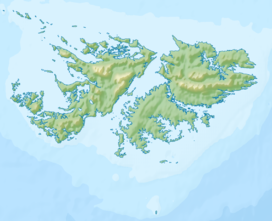Mount Usborne
| Mount Usborne | |
|---|---|
 | |
| Highest point | |
| Elevation | 705 m (2,313 ft)[1] |
| Prominence | 705 m (2,313 ft)[1] |
| Coordinates | 51°41′30″S 58°50′04″W / 51.69167°S 58.83444°W |
| Geography | |
| Parent range | Wickham Heights |
Mount Usborne (Spanish: Cerro Alberdi) is a mountain on East Falkland. At 705 m (2,313 ft) above sea level, it is the highest point in the Falkland Islands. It is only 5 metres (16 ft) taller than Mount Adam, the highest peak on West Falkland.
The mountain is referenced by Charles Darwin in Chapter 9 of Zoology of the Voyage of H.M.S. Beagle. It is named after Alexander Burns Usborne,[2] master's assistant on HMS Beagle, the ship that took Darwin on his famous voyage.
As one of the highest mountains of the Falklands, it experienced some glaciation. The remains of glacial cirques can be seen on the mountain. The handful of Falklands mountains over 600 m (2,000 ft) have
... pronounced corries with small glacial lakes at their bases, morainic ridges deposited below the corries suggest that the glaciers and ice domes were confined to areas of maximum elevation with other parts of the islands experiencing a periglacial climate.[3]
References
- ^ a b "Mount Usborne, Falkland Islands". Peakbagger.com. Retrieved 3 August 2014.
- ^ Alexander Burns Usborne
- ^ Strange, Ian (1983) The Falkland Islands
Sources
- Stonehouse, B (ed.) Encyclopedia of Antarctica and the Southern Oceans (2002, ISBN 0-471-98665-8)
External links
- A Stroll up Mount Usborne
- Satellite picture of Mount Usborne at the Wayback Machine (archived December 23, 2010)

